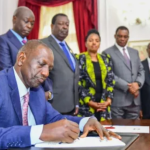Internet users in Kenya, Tanzania, Rwanda, and Uganda have been expressing dissatisfaction with poor connectivity, as acknowledged by service providers across East Africa. The issue, attributed to faults in undersea cables connecting the region to the global network via South Africa, has prompted efforts to rectify the situation.
Impact of Cable Faults
Ben Roberts, an industry expert, explained to the BBC that the patchy service was due to faults in undersea cables. Tanzania experienced particularly severe disruptions, with internet traffic plummeting to 30% of expected levels, according to Cloudflare Radar. Tanzania’s Citizen newspaper described the situation as an “internet blackout” affecting major network channels.
Service Providers Respond
On social media platforms like X (formerly Twitter), frustrated customers have been seeking answers from service providers. Airtel Kenya and Safaricom in Kenya, as well as Airtel Uganda and MTN Rwanda, acknowledged the issue and assured users that they were working to resolve it. Cloudflare Radar also reported connectivity issues in Malawi, Mozambique, and Madagascar.
Cause of Cable Cuts
Mr. Roberts clarified that one cable, the Eassy cable, was cut approximately 45km north of Durban, South Africa. Another cable was also affected. He dismissed the notion of sabotage, attributing the incidents to unfortunate coincidences. Although alternative cables exist linking East Africa to Europe, the damage to the Eassy cable had a significant impact due to the presence of major data centers in South Africa.
Widespread Outages
Similar cable failures in March led to widespread outages in countries across Africa, including South Africa, Nigeria, Ivory Coast, Liberia, Benin, Ghana, and Burkina Faso. While the exact cause of these failures remains unclear, they caused frustration for millions of customers continent-wide.
Efforts to Restore Connectivity
Efforts are underway to repair the damaged cables and reroute data, gradually improving internet service across the affected regions. However, the incidents underscore the vulnerability of Africa’s internet infrastructure and the importance of maintaining and upgrading these critical connections.



